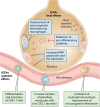Short-Chain Fatty Acids as a Potential Treatment for Infections: a Closer Look at the Lungs
- PMID: 34097474
- PMCID: PMC8370681
- DOI: 10.1128/IAI.00188-21
Short-Chain Fatty Acids as a Potential Treatment for Infections: a Closer Look at the Lungs
Abstract
Short-chain fatty acids (SCFAs) are the main metabolites produced by the gut microbiota via the fermentation of complex carbohydrates and fibers. Evidence suggests that SCFAs play a role in the control of infections through direct action both on microorganisms and on host signaling. This review summarizes the main microbicidal effects of SCFAs and discusses studies highlighting the effect of SCFAs in the virulence and viability of microorganisms. We also describe the diverse and complex modes of action of the SCFAs on the immune system in the face of infections with a specific focus on bacterial and viral respiratory infections. A growing body of evidence suggests that SCFAs protect against lung infections. Finally, we present potential strategies that may be leveraged to exploit the biological properties of SCFAs for increasing effectiveness and optimizing patient benefits.
Keywords: bacteria; gut; respiratory infection; short-chain fatty acid; virus.
Figures


References
-
- Tan J, McKenzie C, Potamitis M, Thorburn AN, Mackay CR, Macia L. 2014. The role of short-chain fatty acids in health and disease, p 91–119. In Alt F (ed), Advances in immunology, vol 121. Academic Press, Cambridge, MA. - PubMed
Publication types
MeSH terms
Substances
Grants and funding
LinkOut - more resources
Full Text Sources

